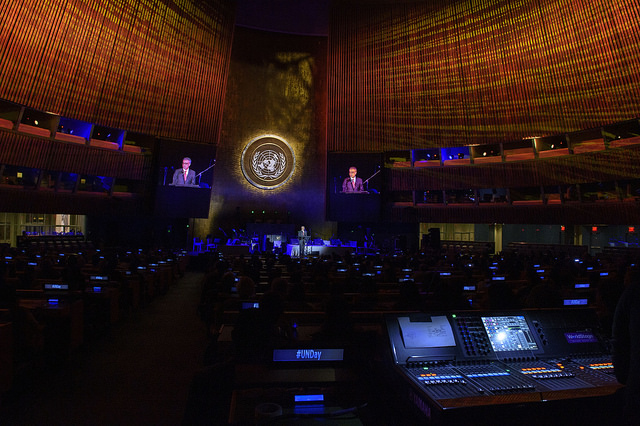A permanent seat at the UN for the EU. Is it such a good idea?
(B2) German Deputy Prime Minister Olaf Scholz threw a stone into the pond at the end of November, by proposing to transform the French seat on the UN Security Council. “Bold” and “intelligent” idea, he says. Let's see, let's see...

What did the German vice-chancellor say?
First of all, you have to read the proposal of the Minister of Finance – who is also the Vice Chancellor of the Social Democrats (SPD) – carefully and not stop at the first sentence. France is not giving up its seat at the UN, as some have written. This becomes a seat where France speaks permanently on behalf of the European Union, retaining the right to appoint a national (or not) as its representative.
(in original language) Ich schlage vor: Mittelfristig könnte der Sitz Frankreichs in einen EU-Sitz umgewandelt werden – im Gegenzug sollte Frankreich dann permanent den EU- Botschafter bei den Vereinten Nationen stellen. Mir ist klar, dass es dazu sicherlich in Paris noch einiger Überzeugungsarbeit bedarf, aber ein kühnes und kluges Ziel wäre es.
(which gives in French) I suggest that in the medium term, the seat of France can be converted into the seat of the EU. In return, France would then have to permanently appoint an EU ambassador to the United Nations. For me it's clear that it still requires a bit of persuasion in Paris, but it would be a bold and smart goal.
An interesting proposal?
This proposal is indeed 'bold'. She would have an intense symbolic value. Having a permanent seat for the European Union would be interesting. Without going into the legality of this system (1), it can however be noted that on many points where the UN Security Council is debating, it would not pose too much of a problem for the Europeans to have a united position. On the Horn of Africa, on the Central African Republic, on the Sahel, on Sudan, on the Rohingyas, on North Korea, even on the situation in Ukraine or the conflict in Syria, the Europeans have a message, almost common, if not totally united. Those who claim that there is almost no issue where Europeans can speak with one voice are wrong. On the other hand, on certain key issues – such as the peace process in the Middle East or Kosovo – the Europeans are still strongly divided.
Is the proposal smart?
I leave the authorship of this 'autocompliment' to its author. In the current situation of the UN Security Council, it would be rather simplistic. This year, through the UN electoral system where Eastern and Western Europeans are each entitled to one non-permanent seat, the European Union (at 27) has four out of fifteen seats on the Security Council (France, Belgium, Germany, Poland). Five if we take into account the United Kingdom with which Europe shares most diplomatic values. It is disproportionate compared to the real European weight in world affairs. Giving the French headquarters the role of representing the European Union would be a real breath of fresh air to reform a system considered unequal by other continents. In the end, reducing the weight of the European Union in the international security body from four to one would not be a great diplomatic victory for Europe...
What context underlies this proposal?
This proposal is part of a “medium-term” reflection, as the author indicates, to strengthen the weight of Europe in the world. It is concomitant with projects (still not completed) to reform the UN Security Council to make it more representative of today's world, as well as Berlin's desire to play a more important role in the world in general and in particular in get a seat on the UN Security Council. Germany's 'real' goal.
What is the point ?
This proposal, even unimplemented or inapplicable, nevertheless deserves attention. She points her finger to a specific deal: after Brexit, France will be the only permanent member of the United Nations Security Council, able to represent and defend European interests, with the ability (if necessary) to veto on certain decisions. This endows France with a certain responsibility towards its European partners for circulating information, as well as for expressing European concerns to the other members of the Security Council. Moreover, nothing would prevent the French representation from having a leading diplomatic post reserved for these European exchanges. This proposal would also have an interest: to make more visible what is happening in the corridors of the United Nations: the permanent consultation between Europeans sitting on the Security Council to adjust their positions and defend their interests.
(Nicolas Gros-Verheyde)
Read also: After Brexit, France will have to assume an increased role at the United Nations on its own
- Some argue that the seat is assigned to a country and not an organization. Certainly. But there is some flexibility. This is how Italy and the Netherlands decided in 2017-2018 to share a seat on the Security Council, dividing it into two periods of one year (and not on the two-year mandate dedicated to a single country as wanted Rule). This demonstrates that the question is above all political and not legal.
